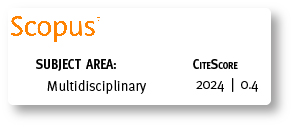Aplicación Facebook para la gestión de objetos de aprendizaje en redes sociales
Abstract
ABSTRACT
With the evolution of Facebook into a platform, the objective of this work was to evaluate how reliable is it to build a Facebook application for managing learning objects in social media. The paper provides a description of the design and implementation of the proposal, and the analysis of the main contributions. The results of the study are twofold: The flexibility of the Facebook was demonstrated and the convergence of both, data and programming languages, was corroborated. The developed application is easily integratable in the canvas of Facebook and implemented using JavaScript as data and programming language in the client and server layers of the software architecture. The developed application enhances the management of learning objects in the environment of Facebook, providing the benefits of the creation of interest groups and the social actions enhancing the usability of learning objects.
Keywords: Social media, learning object, Facebook application, JavaScript, e-learning.
RESUMEN
Con Facebook convertido en plataforma, el objetivo de este trabajo fue evaluar la posibilidad de implementar una aplicación Facebook para la gestión de objetos de aprendizaje a través de las redes sociales. En este artículo se describe el diseño e implementación de la solución propuesta y se analizan las implicaciones fundamentales de su uso. Como resultado del trabajo, se comprobó la flexibilidad y extensibilidad de la plataforma Facebook y el grado de convergencia que han sufrido los lenguajes de programación y de datos. Fue posible desarrollar una aplicación que se integra satisfactoriamente al canvas de Facebook y dicha aplicación fue implementada haciendo uso de JavaScript como lenguaje de datos y para la programación en la capa cliente y servidor. La herramienta desarrollada potencia la creación y fortalecimiento de un espacio reservado para la gestión de objetos de aprendizaje dentro de Facebook, con los beneficios de la creación de grupos de interés y de que dichos objetos de aprendizaje se valoren de acuerdo a las acciones sociales que se realicen sobre ellos.
Palabras clave: Red social, objeto de aprendizaje, aplicación Facebook, Javascript, e-learning.
Downloads
Metrics
References
Sites Such as Facebook among Asia Pacific University Scholars in Malaysia. International
Journal of Business and Social Science, 5(10), 133-145.
Ashrov, A., A. Marron, G. Weiss, G. Wiener, 2015. A use-case for behavioral programming: an
architecture in JavaScript and blockly for interactive applications with cross-cutting scenarios.
Science of Computer Programming, 98, 268-292.
Bouadjenek, M., H. Hacid, M. Bouzeghoub, 2015. Social networks and information retrieval, how
are they converging? A survey, a taxonomy and an analysis of social information retrieval
approaches and platforms. Information Systems, 56, 1-18.
Chen, C., S. Wu, 2015. A case study exploring junior high school students’ interaction behavior in a
learning community on Facebook: Day and time. International Journal of Learning, Teaching
and Educational Research, 12(2), 99-106.
Facebook, 2016. Facebook Graph. Disponible en https://developers.facebook.com/docs/graph- api.
Gómez, M., S. Roses, P. Farias, 2011. The Academic Use of Social Networks among University
Students. Comunicar, 38, 131 – 138. http://doi.org/10.3916/C38-2012-03-04
Howison, J., A. Wiggins, K. Crowston, 2010. Validity Issues in the Use of Social Network Analysis for the Study of Online Communities. JAiS, Mayo, 1-28.
Junco, R., 2012. Too much face and not enough books: The relationship between multiple indices of
Facebook use and academic performance. Computers in Human Behavior, 28(1), 187–198.
Junco, R., C. Clem, 2015. Predicting course outcomes with digital textbook usage data. The Internet
and Higher Education, 27, 54-63.
Kirschner, P., 2015. Facebook as learning platform: Argumentation superhighway or dead-end
street? Computers in Human Behavior. 10.1016/j.chb.2015.03.011
Nandez, G., 2013. Use of social networks for academic purposes: a case study. The Electronic
Library, 31(6), 781–791.
Nielsen, N., 2016. 10 Usability Heuristics for User Interface Design. Disponible en:
https://www.nngroup.com/articles/ten-usability-heuristics/
Puhl, T., D . Tsovaltzi, A. Weinberger, 2015a. A Long-Term View on Learning to Argue in Facebook:
The Effects of Group Awareness Tools and Argumentation Scripts. In: Proceedings of the
Computer Supported Collaborative Learning Conference (CSCL), Gothenburg, Suecia.
Puhl, T., D. Tsovaltzi, A. Weinberger, 2015b. Blending Facebook discussions into seminars for
practicing argumentation. Computers in Human Behavior, 53, 605-616.
W34Tech, 2016. Estadísticas de uso de Apache. Disponible en:
http://w3techs.com/technologies/details/ws-apache/all/all
Yunus, M., H. Salehi, 2012. The effectiveness of Facebook groups on teaching and improving writing:
Students’ perceptions. International Journal of Educational and Information Technologies,
6(1), 87-96.
Downloads
Published
How to Cite
Issue
Section
License
Copyright © Autors. Creative Commons Attribution 4.0 License. for any article submitted from 6 June 2017 onwards. For manuscripts submitted before, the CC BY 3.0 License was used.
![]()
You are free to:
 |
Share — copy and redistribute the material in any medium or format |
 |
Adapt — remix, transform, and build upon the material for any purpose, even commercially. |
Under the following conditions:
 |
Attribution — You must give appropriate credit, provide a link to the licence, and indicate if changes were made. You may do so in any reasonable manner, but not in any way that suggests the licenser endorses you or your use. |
| No additional restrictions — You may not apply legal terms or technological measures that legally restrict others from doing anything the licence permits. |









